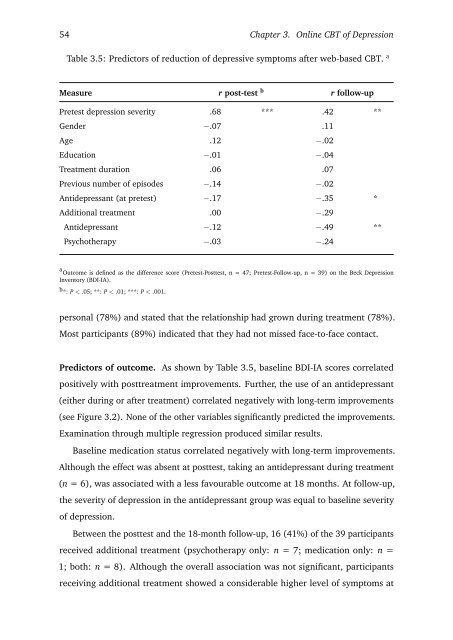The Efficacy and Effectiveness of Online CBT - Jeroen Ruwaard
The Efficacy and Effectiveness of Online CBT - Jeroen Ruwaard
The Efficacy and Effectiveness of Online CBT - Jeroen Ruwaard
- No tags were found...
Create successful ePaper yourself
Turn your PDF publications into a flip-book with our unique Google optimized e-Paper software.
54 Chapter 3. <strong>Online</strong> <strong>CBT</strong> <strong>of</strong> DepressionTable 3.5: Predictors <strong>of</strong> reduction <strong>of</strong> depressive symptoms after web-based <strong>CBT</strong>. aMeasure r post-test b r follow-upPretest depression severity .68 *** .42 **Gender −.07 .11Age .12 −.02Education −.01 −.04Treatment duration .06 .07Previous number <strong>of</strong> episodes −.14 −.02Antidepressant (at pretest) −.17 −.35 *Additional treatment .00 −.29Antidepressant −.12 −.49 **Psychotherapy −.03 −.24a Outcome is defined as the difference score (Pretest-Posttest, n = 47; Pretest-Follow-up, n = 39) on the Beck DepressionInventory (BDI-IA).b *: P < .05; **: P < .01; ***: P < .001.personal (78%) <strong>and</strong> stated that the relationship had grown during treatment (78%).Most participants (89%) indicated that they had not missed face-to-face contact.Predictors <strong>of</strong> outcome. As shown by Table 3.5, baseline BDI-IA scores correlatedpositively with posttreatment improvements. Further, the use <strong>of</strong> an antidepressant(either during or after treatment) correlated negatively with long-term improvements(see Figure 3.2). None <strong>of</strong> the other variables significantly predicted the improvements.Examination through multiple regression produced similar results.Baseline medication status correlated negatively with long-term improvements.Although the effect was absent at posttest, taking an antidepressant during treatment(n = 6), was associated with a less favourable outcome at 18 months. At follow-up,the severity <strong>of</strong> depression in the antidepressant group was equal to baseline severity<strong>of</strong> depression.Between the posttest <strong>and</strong> the 18-month follow-up, 16 (41%) <strong>of</strong> the 39 participantsreceived additional treatment (psychotherapy only: n = 7; medication only: n =1; both: n = 8). Although the overall association was not significant, participantsreceiving additional treatment showed a considerable higher level <strong>of</strong> symptoms at


